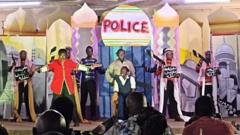A national high-school drama competition in Kenya turned turbulent when police fired tear gas to disperse a crowd eager to watch a play that critiques political leadership. The event saw students boycott a performance amid tensions over the detention of the play's author, drawing significant public attention and criticism about state repression.
Chaos Erupts as Police Clash with Students at Kenya's High-School Drama Competition

Chaos Erupts as Police Clash with Students at Kenya's High-School Drama Competition
Kenyan police deployment leads to protests and tear gas during a controversial high-school play about youth disillusionment with leadership.
In a dramatic turn of events, Kenya's national high-school drama competition faced chaos when police deployed tear gas to control crowds at the venue of a controversial play, "Echoes of War". The production, set in a fictional kingdom, reflects the growing discontent among youth toward their leaders, inspired by last year’s protests against tax hikes. Initially barred from competing due to unclear reasons, a High Court's recent decision allowed the play to take part, intensifying the stakes for all involved.
The unrest erupted in Nakuru as students from Butere Girls School exited the venue in solidarity with their author, Cleophas Malala, who had been detained by police the night prior. Malala, a former senator and scriptwriter for the play, was prevented from final rehearsals and later released without any charges. Upon his release, Malala commended the students for their courageous stand, pledging to ensure "Echoes of War" reaches a wider Kenyan audience.
Students dramatically sang the national anthem before walking out of the hall, which had been secured by riot police equipped with tear gas. “There’s no audience. Who are we performing for?” one student voiced her frustrations publicly, adding complaints about police intimidation. Despite Malala’s detention, a large audience gathered outside in hopes to witness the performance, leading to tear gas being fired to disperse the crowd.
Education Minister Julius Ogamba expressed concerns about the involvement of Malala, asserting that politicians should not engage in student affairs, while Interior Minister Kipchumba Murkomen echoed the need to separate politics from education. Such remarks have sparked significant debate among the public. Human rights organization Amnesty International characterized the incident as a "worrying pattern" of government suppression against free expression and association.
Chief Justice Martha Koome criticized the authorities, asserting that Malala’s detention violated a court order. Prominent opposition leader Kalonzo Musyoka condemned the police response, praising the students for their resistance. In solidarity with the students, the opposition party Orange Democratic Movement called for the right to perform, emphasizing the need for artistic freedom in educational contexts.




















